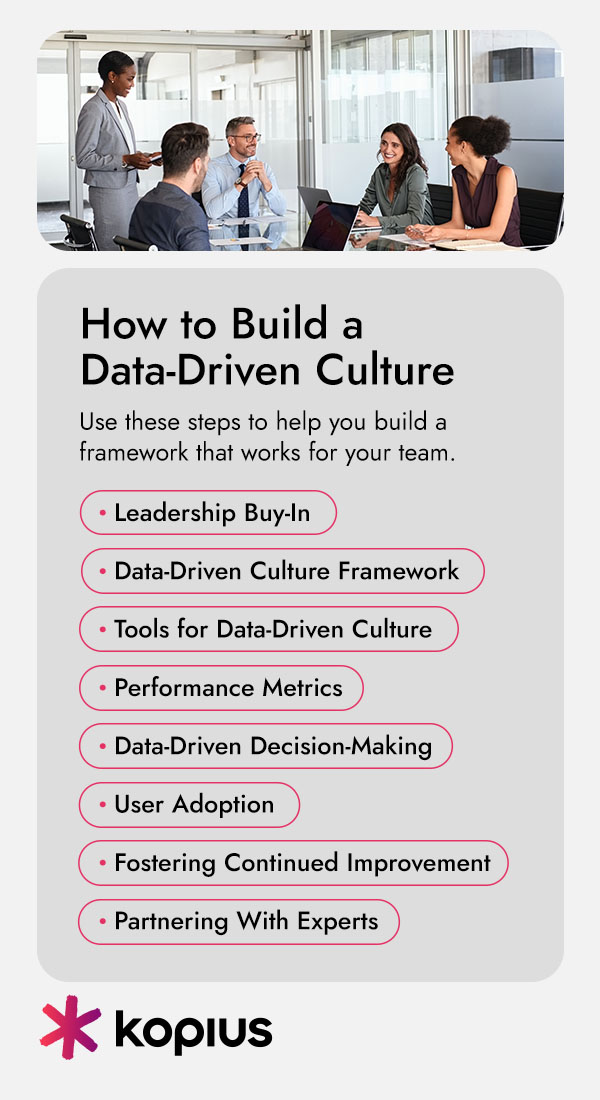
Today’s world is more interconnected than ever. Trying to succeed in a globally connected space means every little edge makes a difference. Data runs at the heart of innovation — how can you tweak things to make efficiency that much higher and your team even slightly more productive? With data giving you accurate, fast information, your company can truly thrive.
Building a data-driven culture can transform your organization, allowing you to make better decisions, boost efficiency, and support innovation. If you’re interested in fostering a data-driven culture, you need to understand data and how to use it.
What Is a Data-Driven Culture?
The meaning of a “data-driven culture” is a business that backs its decisions with data. Data analysis and interpretation are the foundation for decision-making, whether through daily tasks or long-term strategies. While intuition can be helpful sometimes, data-driven cultures use concrete stats to give them a solid understanding of how their company is doing and where it needs to go.
Today, data-driven cultures are critical for modern business success. Using all available resources maximizes your knowledge and gives you more resources to advance. With data informing your decisions, your team can make more informed moves, identify trends, predict customer behavior, and streamline processes. A data-driven culture is important for creating efficient, targeted cultures, letting you improve productivity and see results.
Characteristics of a Data-Driven Culture
Understanding what makes up a data-driven culture can help you craft your approach and ensure success. A data-driven culture should have:
- Data accessibility: To make data useful, it needs to be accessible. Your team needs to eliminate data silos and ensure each department gets the relevant information it needs for decision-making.
- Data accuracy: Your decisions are only as good as your data. A company’s data needs to be of good quality, up to date, and accurate. Regular checks protect data quality to ensure you make decisions based on good data.
- Data transparency: Decisions based on data should have a clear logic. If you hide the data you use internally, how can your company trust the decisions different teams make? Transparency around the data you use for your decisions encourages trust and collaboration.
- Data development: Finally, since data is always changing, your team should constantly be growing in their approach to data. Encourage your team to become more data-literate and keep your organization on top of new data practices. You’ll boost data security and your team’s ability to adapt to changing trends.
Some examples of data-driven culture are Google and Amazon. Google is constantly collecting data on search engine users to tailor results to each user’s search goals, creating a more accurate, seamless experience. Amazon takes data from customers’ buying history and browsing habits to personalize their shopping recommendations, driving more sales.
The Benefits of a Data-Driven Culture
Building a data-driven culture can transform your company’s success. Is a department falling behind? Are customers responding to a product or service well? Where are the gaps in your company’s approach? Data can help you answer these questions.

Once you have the information at your fingertips, you can use it to transform your success. Data-driven culture benefits include:
- Enhanced decision-making: Take the guesswork out of your decision-making with accurate data. Data gives you clear insights into customer behavior, market trends, and internal operations. This information lets you make more informed decisions about your next moves.
- Improved operational efficiency: A data-driven approach can also improve your operational efficiency. Analyzing data shows you bottlenecks, process inefficiencies, and poor resource allocation. You can streamline these areas to save time and money, creating more value.
- Competitive advantage: Finally, data-driven approaches give you a competitive advantage. Data gives you accurate information faster. This means you can anticipate customer needs, innovate, and respond to market shifts more quickly than the competition.
How to Build a Data-Driven Culture
With new technology and strategies, you can maximize your data use to create an effective data-driven company culture. Use these steps to help you build a framework that works for your team.
1. Leadership Buy-In
Creating a new culture starts with the leadership. Leadership buy-in is critical because it sets the tone for the rest of your journey. Executive management can lead the charge with decisions made with the support of transparent data. When you start using your data at the top, it sends a clear message to the company that this is a valuable asset for everyone.
Encourage leadership buy-in by clearly laying out the benefits of a data-driven organization. Showing the real results of data can convince leadership to come on board fully — use case studies from successful companies to demonstrate its value and the competitive advantage it delivers. Get leadership to set clear goals that have measurable objectives. With progress tracking for leadership goals, leaders show data’s value and encourage everyone else to follow.

2. Data-Driven Culture Framework
Once you have the leadership behind you, you need to set up a framework. Having a clear path to success is motivating and keeps everyone on track. Here’s a rough framework you can use as a jumping-off point:
- Assessment: First, assess your company’s current data usage. What are your existing data systems? Where are your data gaps? How do you currently use data to make your decisions? Once you know what you’re working with, you can find improvement areas and set steps to address them.
- Data policies: Set policies for collecting, storing, managing, and sharing data. Make sure you’re following relevant data protection regulations. Protecting data quality and security ensures you use accurate data while maintaining trust.
- Training: All employees should receive training on working with data. Offer training programs, ongoing learning, and workshops to improve data literacy. The more your team knows about using data, the more effectively they can wield it to meet your goals.
- Collaboration: Make sure your departments can always access the data they need. Avoid data silos and encourage cross-functional teams to get better insights into data. Regular communication keeps everyone on the same page, ensuring successes and challenges are addressed effectively.
3. Tools for Data-Driven Culture
You need more than good planning for a successful culture transformation. The right tools enable you to collect and analyze data, creating an effective strategy efficiently. Software and platforms that can help you out include data analytics tools, business intelligence (BI) platforms, data visualization software, machine learning (ML), and artificial intelligence.
Analytics tools allow teams to analyze large datasets quickly, getting actionable insights. BI platforms let you easily visualize data so it’s more understandable for your team.
4. Performance Metrics
Key performance indicators (KPIs) tell you whether your data-driven approach is effective. KPIs provide you with concrete measurements, helping you meet your goals.
Identify your KPIs — include metrics like data-driven decisions, customer satisfaction scores, revenue growth, or operational efficiency. You want to choose KPIs that align with your business objectives while clearly showing how your organization uses data.
Once you have your KPIs, you need to keep monitoring them. Set up dashboards with real-time data updates and schedule reviews. Regular monitoring allows you to stay on top of your progress and adjust as needed to keep on track with your goals. You’ll make timely adjustments to your strategies and avoid being surprised by the data when it’s too late.
5. Data-Driven Decision-Making
All of this data cultivation has been in service of data-driven decision-making. Your culture should revolve around how data influences your decisions. Start this step by incorporating data into all aspects of your business. Encourage teams to explore data before they enter a new market, launch a product, or optimize internal processes. Push everyone to consult data where necessary for better decision-making.
Use statistical analysis, predictive modeling, and ML to gain deeper data insights. These tools break your data down into patterns, showing you the gaps in your strategy. With clear and actionable insights from your data, you can really start implementing effective decision-making.
6. User Adoption
Employees have to engage with data to make successful, data-driven decisions. The easier it is for your team to use and access data, the more they’ll use it. Make your data tools easily accessible and user-friendly.

Training and development are essential for user adoption. Invest in regular training sessions to ensure everyone is on the same page about your tools. These sessions will help your team understand how to use the tools and make data-driven decisions. Encourage everyone to keep learning. Support ongoing development — the more up to date your team is, the more effective and competitive their work will be.
7. Fostering Continued Improvement
Instilling a data-driven culture is all about using data to continually improve your company. Extend this philosophy to your entire team. Set up feedback measures so you can regularly assess and adjust your approach, and ask employees about the tools and processes they use. Collecting feedback lets you know what’s working and where you need improvement.
Open communication is essential for this step. Encourage employees to share their experiences with data tools and strategies. Let them know you value their input and want to hear more. Focus groups, regular surveys, and informal discussions can help you get to the heart of your approach. Additionally, review, test, and improve your data strategies for better results. Use an ongoing dialogue to keep your company responsive and on the cutting edge.
8. Partnering With Experts
Building a data-driven culture within your company is challenging. Accessing improved decision-making and gaining a competitive edge are excellent benefits. However, achieving this shift might be outside your organization’s current capabilities. This is where partnering with experts is invaluable.
Working with experts allows your company to tap into specialized knowledge and experience. If you want a smooth transition into a data-driven culture, you should lean on trusted support resources. Experts can look at your company and point you toward the right tools for the job. Additionally, they can create tailored digital strategies and best practices that align with your goals. Leveraging their industry knowledge takes you over common challenges straight to success without the learning curve.
Why Choose Kopius?
Kopius is your solution to navigating data-driven transformations. With a combination of digital strategy, design, and engineering expertise, we unlock growth across the customer experience. Our end-to-end capabilities support every aspect of your shift to a data-driven culture. Use our ideation workshops and digital product development to take data and innovation to the next level.
With team members in the United States and Latin America operating in your time zone, Kopius simplifies getting the right solutions. Our approach combines high-quality, reliable solutions with efficiency and speed. These qualities keep your company on pace with changing technological advancements.
Whether you need project-based teams, embedded delivery, or managed services, Kopius can help. With a 92% client retention rate and a team of over 600 specialists, Kopius is dedicated to helping your business thrive.

JumpStart Your Data-Driven Culture With Kopius
If you want to stay competitive in today’s business landscape, you need to invest in a data-driven culture. Getting started on your own might delay your productivity, setting you back before you start seeing success. With Kopius, you can skip the challenge of shifting cultures and get expert support for your new strategy. As experts in digital strategy, design, and engineering, we provide the guidance you need to unlock your data’s full potential.
We understand that every business is unique. That’s why we offer tailored solutions to align with your specific goals. Whether you need help with data planning, architecture, engineering, or advanced analytics, our team delivers results. By partnering with us, you gain access to cutting-edge tools and strategies to turn your data into a powerful asset.
Our track record and nearshore delivery model ensure your transition is smooth. Let our expert team members give you the support you need to sustain a data-driven culture. With our help, you can experience enhanced operational efficiency, better decision-making, and a competitive edge.
Don’t let the complexities of data management hold you back. Let Kopius’ data strategy services set you on the path to long-term success. Contact us to start your digital transformation today! Together, we can build a future where data empowers every part of your organization.
Related Services:
Additional Resources:
- Comprehensive Guide to Integrating Diverse Data Sources
- Data Lakes: The Foundation of Big Data Analytics
- Setting Up a Data Lake is More Achievable Than You Think